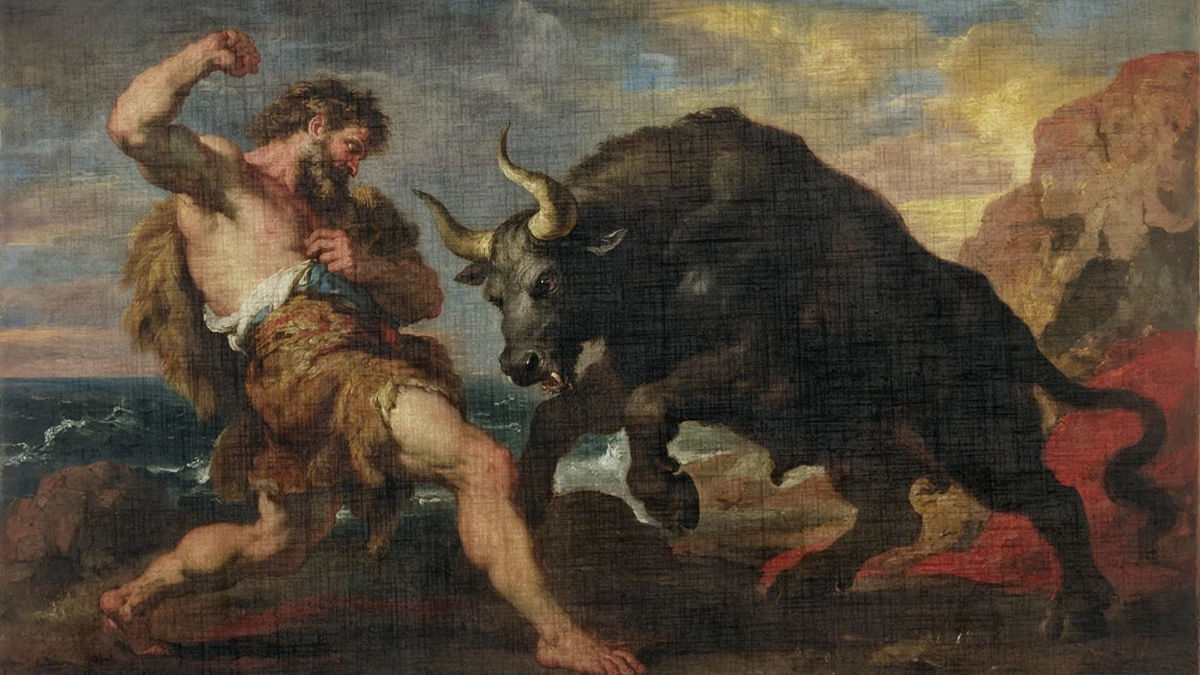Six times already had Heracles appeared in Mycenae, each time setting forth at King Eurystheus’ command on a perilous and arduous journey. Six glorious deeds had he accomplished: he slew the Nemean Lion, destroyed the Lernaean Hydra, captured the Ceryneian Hind, brought the Erymanthian Boar to Mycenae, drove the Stymphalian Birds from Greece, and in a single day cleansed the Augean Stables. And now once more Eurystheus summoned the hero, commanding him to sail across the sea to the island of Crete and subdue the ferocious bull that no Cretan could master.

This bull had once swum to Crete’s shores, and King Minos had vowed to sacrifice it to Poseidon, god of the seas. But the snow-white bull with golden horns so delighted Minos that the king kept it for himself, offering Poseidon another bull in its stead. Enraged, the sea god drove the splendid beast into madness. The bull broke free from its stall, fled the royal courtyard, and became the terror of the entire island.
Heracles journeyed to the shore, boarded a Phoenician ship, and set sail for Crete. A storm arose, tossing the vessel across the raging sea until at last it shattered, casting its wreckage upon the shores of an unknown land.
Here grew trees resembling clusters of giant feathers: thick stems sprouted directly from their trunks, bearing leaves so vast a man could shelter beneath each. Heracles and his surviving companions rested in their shade before trekking along the coast over burning yellow sands. After a long march, they reached a great coastal city. Its harbor teemed with ships, while stone palaces and temples loomed ashore.
“You are in Egypt,” townsfolk rushing to a temple festival told them, “ruled by the mighty and fearsome King Busiris.”
Heracles asked to be taken to the king. Yet scarcely had the strangers entered the palace when guards seized and shackled them.
“You come at an auspicious time,” Egypt’s cruel ruler declared. “Today is our festival, and I shall sacrifice you to the gods.”
“The gods do not accept human sacrifice,” Heracles protested.
But Busiris only laughed: “We shall see! You’ll be the first slain by the priest—let us observe if the gods find you worthy.” He ordered the captives taken to the city’s central temple.
As Heracles and his men stood within the crowded temple, the altar fires were lit. But the moment the aged priest raised his long, sharp knife, Heracles flexed his mighty muscles and shattered his chains. With a broken link, he struck down the priest, then in fury scattered the royal guards, wrested Busiris’ sword, and slew the wicked king. Awed by the hero’s strength, the Egyptians dared not oppose him. Freeing his companions, Heracles hastened to the shore where they found a ship bound for Crete.
Swiftly they reached Cretan waters. Heracles bade his crew farewell and walked alone along the coast until he spied the maddened bull. Chains rattling, eyes bloodshot, it charged with furious bellows, froth flying from its jaws. Heracles ducked behind a tree, waiting as the beast halted, lowered its head, and pawed the earth. In one motion, he seized the trailing chain, leapt astride the bull’s back, and twisted the links around its horns. The creature bucked wildly, but Heracles held fast. With a pitiful roar, the bull plunged into the sea—where Poseidon’s rage left it. Tamed as a plow ox, it swam obediently to Mycenae.
Heracles led it to Eurystheus’ cattle pens, but the herdsmen, fearing its fury, failed to contain it. The bull escaped to roam the Peloponnese until Theseus, Heracles’ friend, captured it at last and offered it to the gods.